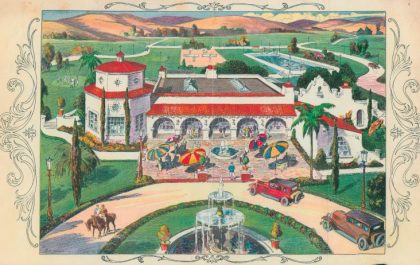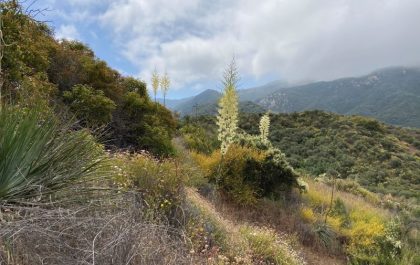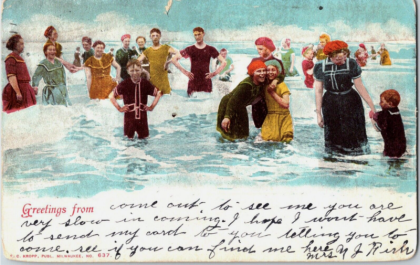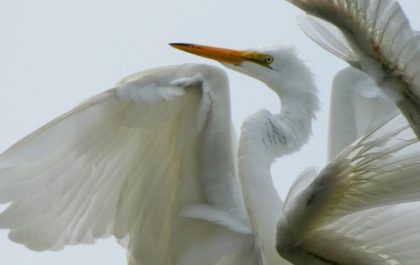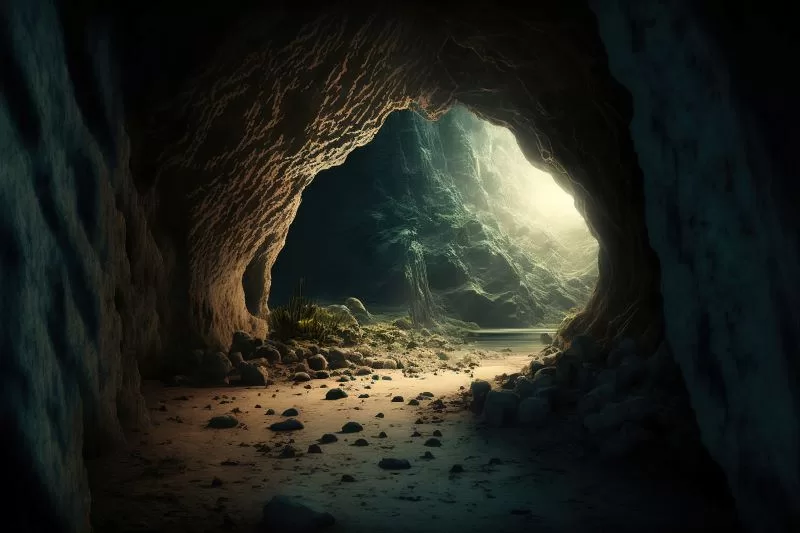
The war continued to escalate all summer in Europe and the Pacific, but the sun shone every day in Malibu, California. Jessie and I spent whole days at the beach. I learned to swim and to surf. A friend of Aunt Maddie’s who had a little bungalow on the beach at the Colony let us use her surfboards. They were wooden slabs and awfully heavy, but it was worth the effort of dragging them down into the water to catch a wave and ride it all the way to the shore. Sometimes the Army guys who manned the anti-aircraft installations would give us a hand carrying the boards in exchange for a chance to try their luck surfing. A lot of them were like me, never having seen the ocean before coming to California. Except for the Army and the Coast Guard men who patrolled the coast, Jessie and I had the beach to ourselves most days. There weren’t many people that summer in the houses along the coast.
Sometimes Aunt Maddie came down to the beach with us. She was a powerful swimmer and knew a lot about the ocean animals. When it was too hot at the beach, Jessie and I retreated to the canyon. We made a sort of club house under the big oak by the creek trail. It was just wood from some packing boxes and two old blankets strung on a laundry line, but we had orange crates to sit on inside and a homemade hammock.. It made a good basecamp for egyptologists, jungle explorers, and reconnaissance scouts, although it wasn’t the same without our friend Kitty. By late July, though, it was too hot to do anything, so we just sat in the shade and waited for it to be cooler.
It was Jessie who got the idea for camping out there. “We used to go on the loveliest vacations before the war, James,” she sighed. “Dad would take us camping in the Sierras. Once we stayed at a huge old lodge in Yosemite, and another time in a tent in the sequoias, in the middle of a grove of the biggest trees on earth. It was just him and my brother Dan and me. No babies, or nannies, or stepmothers. And we went fishing, and once we saw a bear, and it was the best. I know we can’t do anything like that because of the war, but we could camp here and pretend it was someplace far away.”
Aunt Maddie not only agreed to the plan, she found us some blankets and pillows to sleep on and a bottle of citronella oil to keep the mosquitos away. She also helped me pack a thermos of hot chocolate and some sandwiches, cookies and oranges.
“Just in case you get lost in the jungle, or trapped in the tree by saber-toothed tigers,” she said.
Aunt Maddie understood about those things.
Jessie and I met after dinner. She had looted her own family’s camping gear and brought a canvas ground cloth, a canteen full of water, two tin cups, a first aid kit, and a coil of rope. “People in stories always need rope and end up having to use their shoelaces and belts instead,” she said.
It took some time to arrange everything. We argued amiably as we set out our bedrolls and stowed our rations. Aunt Maddie surprised us with a visit. She had Yuki on a leash. I had wanted to take the little dog with us, but my aunt had said it was safer for him to stay in the house at night because of the coyotes, who could easily catch and kill a small dog. The problem with Yuki was that he didn’t see himself as a small dog, he saw himself as the leader of the pack and that always got him into trouble.
“Yuki and I wanted to make sure all is well, and that your camp hasn’t been overrun by alligators or discovered by enemy agents,” she said.
She took a seat on an orange crate. Yuki explored the tent, straining to the end of his leash, emitting snuffles and small barks at things only he could detect.
Aunt Maddie admired our camp and told us a story about an Italian explorer who was the first person in modern times to enter the Great Pyramid of Egypt. It was almost dark when she finished, but not as dark and mysterious as it had been inside that pyramid with the rustle of bats and the weight of tons and tons of ancient, massive, granite blocks overhead, and maybe the voiceless ghosts of ancient kings all around.
“Sleep well, and watch out for wandering spirits,” she said, collecting Yuki and heading back towards the house.
We couldn’t have any lights, not even a candle, on account of the Dim Out rule. We sat in the dark and told each other ghost stories for a while, but they weren’t as good as Aunt Maddie’s and the quiet was so intense that even our whispered voices seemed too loud. At last we fell asleep.
I was awakened by the sound of twigs crackling. Something big was out there. Deer, maybe? No, it was a person. I could hear a faint chink and rattle, like metal striking metal. A beam of light from a flashlight swept over our hideout. The sound of footsteps receded along the path. Greatly daring, I crept to the edge of our makeshift tent and peered out under the blanket that served as the front door. There was someone walking quickly along the creek path. He paused when he reached the place where the path divided and flicked on this flashlight again. For a moment I saw him silhouetted by the light. He looked older than Jessie and me, but not quite grown up. He had a backpack with what looked like a pick and a shovel strapped to it. That’s what made the clanking sound. The light was switched off and the stranger moved quickly along the left branch of the trail, heading deeper into the canyon.
This part of the creek was on my aunt’s property. Further down, the creek path was used by people from the different houses in the canyon as a route to the beach, but my aunt’s house was the last one on the road. There was just wild land beyond it and Aunt Maddie owned quite a lot of it—land that had been used for cattle ranching when this was a working ranch but was now turning back into wilderness. People rode through here during the day on horseback to reach the network of trails into the backcountry, and some of the shepherds who ran sheep in the hills came this way sometimes. So did Mr Somov, the hermit who lived in a stone house in the canyon, but this wasn’t any of those people, and no one else had business here after dark.
Jessie was awake now, too. “We should follow them,” she whispered. “It could be a spy or an arsonist or a sheep rustler. I’ll follow. You go for help.”
I wasn’t sure that was a good idea—it never was in stories. “What if it’s an escaped criminal or a mad stabber?” I whispered back. “We’ll stick together.”
We followed, staying in the shadows well behind our quarry. My heart was beating so loudly it seemed that he must hear it, but he never looked back.
When we reached the edge of the wooded area, the stranger paused again to look around with the flashlight. Then he set out at a faster pace, heading up the canyon. It was a lot brighter out in the open, although the only light came from the stars and the waxing moon. We watched as he made his way quickly and carefully up the creek to the mouth of a narrow side canyon. For a moment he stood in front of the dark opening, then he vanished into the ravine.
We watched him make his way up the creek to the mouth of a side canyon and vanish into the darkness.
Jessie and I both knew that one. Aunt Maddie had taken me there to show me a cave with ancient rock art in it. It was a narrow box canyon with no other way in or out that didn’t involve repelling down a vertical cliff. The cave wasn’t very big, it was more of a sheltered area under an overhanging wall of rock. At the back of it, drawn in red and black and still bright and vivid were geometric shapes like stars and snakes. It was a special place, but there was nothing there to lure strangers in the middle of the night.
We made our way over to the opening of the ravine and listened, but we couldn’t hear anything, and it was as dark as a windowless room in the narrow crevasse.
We edged our way in, staying close to the wall where the shadows were deepest. We kept moving farther in, little by little. At last I began to see a little light and hear a soft sound: the shovel was being used to dig into the sandy soil, I thought. He was looking for something. It might be a good idea to let someone else know what was happening. I began to back out, gesturing to Jessie that we should begin retracing our steps, when a scream shattered the silence. Something terrible must have happened to the stranger. He was screaming and crying. Instead of retreating, we both ran forward.
It was an eerie sight. The stranger, harshly lit by his own flashlight, was crouched in the middle of what could only be a grave. There was a jumble of bones all around him. I felt a sudden shock at the sight of the empty eye sockets of a skull, and then a bigger shock when I realized that there was a massive snake right in front of the stranger. It was coiled, head up, tail vibrating with a buzzing sound. The whole scene was lit by the flashlight, propped up in the sandy soil. It looked unreal, like a book illustration or a scene in a movie. The snake, perhaps hearing our approach, withdrew. It moved surprisingly fast, transforming from a tight coil to an undulating mass of muscular curves, as thick around in the middle as a man’s arm. It was a very big snake.
The stranger continued to sob. “It bit me,” he gasped between breaths. It hurts. Am I going to die?” He held out a thin forearm with two puncture marks in it, his face shiny with tears. He really was just a kid, only a few years older than Jessie and me.
“Come on, we have to get you out of here,” I said, trying to help him to his feet while also keeping an eye out for the snake.
“We guided him out of the narrow ravine and found a sheltered place for him to sit. After the close darkness of the narrow space, with its high walls the open air felt cold and bright.
“I have my first aid kit,” Jessie said. “I’m not sure what you do for snakebite, but I can clean and bandage it while you go for help, James.”
I didn’t argue. “I’ll be back as quickly as I can,” I said, breaking into a run. I went as fast as I could. It wouldn’t help if I tripped on a rock or a root and sprained my ankle. It wasn’t very far. I woke the Calzadas up first, because their house was on the way to the main house. Mr Calzada didn’t waste time asking questions, he ran for the stable to get the horses. It only took Aunt Maddie a few minutes to get dressed and call for an ambulance, but waiting was hard. Soon we were mounted and on our way back up the canyon.
The boy had stopped crying but he looked like he might start again any moment. I could tell he was scared. “Am I going to die?” he asked again.
“No.” Aunt Maddie said firmly. “We’re going to get you to the hospital as quickly as I can.”
That didn’t reassure the boy. “I can’t go to the hospital,” he cried. “I don’t have any money.”
“Don’t worry about it,” my aunt said. She spoke with Mr Calzada in Spanish. They had a quick conversation but the only words I was able to pick out were “casa”—house, “cueva”—cave, and “ten cuidado”—be careful.
Mr Calzada gently lifted the boy onto Aunt Maddie’s horse, the big pinto named Monkey, and gave Jessie a boost up behind me on old patient Cosmo. He left his own mount, Ariel, and disappeared into the cave on foot, while the rest of us headed back to the house as fast as it was safe to go.
Mr Calzada had caught up to us by the time we reached the house. He helped Aunt Maddie gently lift the boy down from the horse and get him installed in the waiting ambulance. Mrs Calzada had made the ambulance men coffee and was waiting with them to meet us. Thanks to the Civil Defence war effort, the ambulance was stationed not far up the highway from us and there was always someone on duty, day and night. Driving into town at night during dim out was downright dangerous, but it was clear the boy needed immediate medical help. The arm was swelling beneath the bandages Jessie had applied.
Aunt Maddie and the Calzadas had another conference in Spanish, then Aunt Maddie turned to me. “James, I’m going to go with the patient in the ambulance. He’s frightened and he needs someone with him. Mr Calzada will come into town to pick me up when the sun is up, and you can come with him. Wish us luck!” She gave me a quick hug and climbed in. They were off, without lights or sirens, but going as quickly as possible.
Mrs Calzada put an arm around me and one around Jessie and led us inside. Yuki was glad to see us. He was clearly miffed at having missed a midnight adventure. I sat at the kitchen table with Jessie. The little dog sat on my feet and the big gray cat, Mouse, sat on my lap. Mrs Calzado brought us tea and slices of honey cake filled with cinnamon and walnuts. I was suddenly ravenous. Jessie spent the rest of the night in the guest room, but neither of us could sleep after the excitement of the evening.
I was up bright and early and ready to go into town with Mr Calzado.
We found Aunt Maddie dozing in the chair beside the boy’s bed. She sat up as we entered the room. The boy was asleep. The arm that had been bitten was horribly swollen, and turning black and blue and a kind of greenish color, but he seemed to be resting peacefully. He was skinny, and looked even younger than he had the night before. He really was just a kid like us.
My aunt ushered us out. “He’s stable, and he’ll be OK, but it’s going to take time.” she said. “Let’s go home. They’ll call if there is a change. He doesn’t have any family, so I told them we’re his next of kin. Someone has to keep an eye on him.”
On the way home she told us the boy’s name was Jacob Quinn. He was 16, and had been living on his own for more than a year, since his mother died.
He’s a smart kid,” Aunt Maddie said. “He discovered there’s a good market for Indian artifacts. He studies the old archeological journals at the Santa Monica Library, then takes the bus out when he can afford it, or walks when he can’t, tracks down likely sites and digs for artifacts.”
“It’s not right,” Mr Calzada said, with unusual vehemence. “How would he feel if someone dug up his family’s bones looking for gold teeth or wedding rings to sell?”
“No it’s not right,” Aunt Maddie said. “It’s all wrong, but so is a boy on his own trying to make a living robbing graves.There aren’t any laws protecting Indian burials, but at least there are laws that prohibit trespassing and vandalism. If we pressed charges he would go to jail, and be branded a delinquent or maybe even a criminal, and he isn’t either of those things. I don’t think he is. We had a talk, a long one. He won’t do it again, and we won’t press charges, but I have to think of something he can do after he recovers and before he turns 18 and goes into the army. That’s what he wants to do. He told me he keeps trying to enlist, but he can’t fool anyone into thinking he’s old enough.”
When we got back to the ranch Mr Calzada took Aunt Maddie and me back up the canyon to assess the damage. In the light of day the grave was pathetic rather than frightening. The bones were broken and stained with earth. The artifacts that Jacob Quinn had been so anxious to unearth consisted mostly of stone bowls and grinding stones, and shell beads. There were a lot of bones, although they were so jumbled that it was hard to tell how many graves were there.
We didn’t see the snake, but just thinking about it gave me a funny feeling. Aunt Maddie said it wasn’t unusual for them to be active at night during warm weather, but I was looking at the red and black snakelike images painted on the cliff wall above the graves, and I couldn’t help wondering.
Mr Calzada replaced the shell beads and a smooth black stone pendant that the boy had removed. When Aunt Maddie and I left he stayed behind to rebury the bones. Later, he engineered a small rockfall at the mouth of the canyon to prevent anyone else from disturbing the dead. I was sorry the beautiful rock art images would be sealed up, too, but I soon understood why such a drastic measure was needed. Word of the discovery spread like chicken pox. Soon we had to fend off a horde of treasure seekers, including some determined women who called themselves the “Native Daughters of the Setting Sun” or something like that, and who wanted to excavate the graves to “preserve the history of California,” but Aunt Maddie said it was just ghoulish curiosity.
“There’s a big difference between digging up a grave for fun or profit and using scientific methods to learn from it and understand it, James, but it all involves desecrating a place somebody set aside as sacred and disturbing the bones of someone’s ancestors.”
The dead of Calaveras Canyon would rest in peace as long as she was the steward of the land, she said, and as far as I know, those bones are still in their canyon, undisturbed.
Jacob Quinn was in the hospital for almost two weeks. He came back to stay on the ranch when he was discharged. He had nowhere else to go and no one else to care for him. Aunt Maddie employed him to help Mr Calzada with the ranch work, but mostly his job was to recover his strength and health under Mrs Calzada’s watchful eye.
“He deserves another chance, James,” Aunt Maddie told me. “Everyone does, but not everyone gets one. We’ll do our best to make sure he does.”
